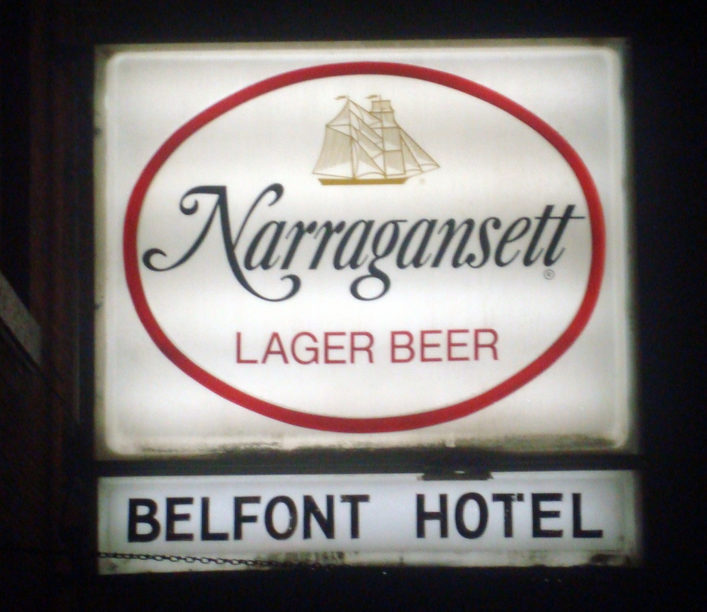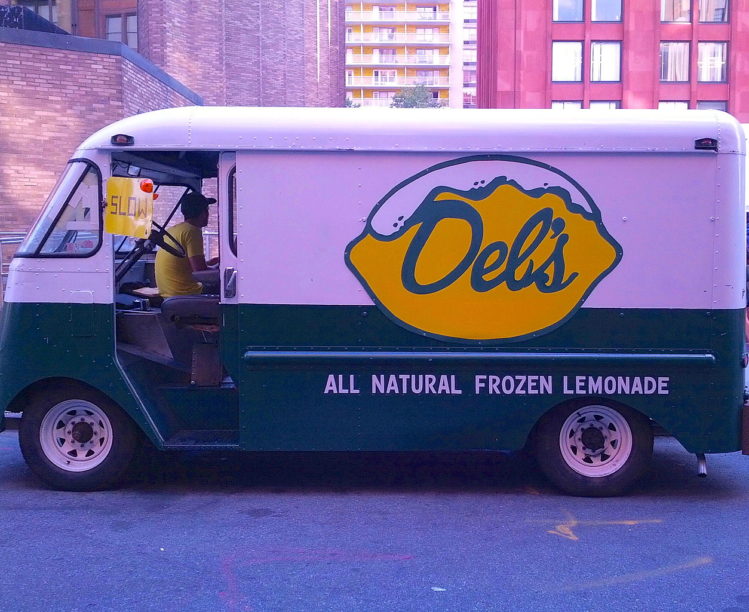I am largely indifferent when it comes to types of beer. Well, this is not exactly true: on balance I would rather drink a nice beer than a Bud Light, though I wouldn’t necessarily elect to pay $8 for it at a bar. I developed a vague liking for IPAs in college when I was trying to be cool, and I like drinking Guinness because I like playing The Guinness Game, which is when you try to drink the exact amount of Guinness in one long gulp that the beer level reaches the place between the harp and the Guinness logo on the glass. But mostly, I tend to think a beer is a beer, which is also my attitude toward other alcohol, since most alcohol tastes basically the same. (Don’t @ me).
There is an exception to this rule, which is also an exception to my preference for decent beer over shitty beer, and that exception is Narragansett, which is the beer of New England. I know this is a bold claim—you might make the case for Sam Adams, Harpoon, Allagash, etc.—and it’s also sort of a false one. According to Wikipedia, “Narragansett was formerly the number one selling beer in New England but it now occupies a relatively narrow corner of the market.” But of no other beer did Curt Gowdy, Major League Baseball broadcaster and longtime “voice of the Boston Red Sox” say, “Hi Neighbor! Have a Gansett!” in his perfect 1950s radio voice. In no other beer do they dump Del’s Lemonade—the sweet-sour secret formula of childhood, usually sold on Rhode Island beaches from old-fashioned trucks—to create the most perfect, shittiest summer drink: “The Narragansett Shandy.” There’s no other beer for which you can pay $3 at a bar, and sip from a tall cold can, thinking, with total clarity and only a hint of irony: “Ah, New England.”

I don’t remember my first Gansett, because there’s no reason it would be memorable. It tastes like a regular beer; I would estimate a step up from Bud Light, a step down from Allagash, but who can really say, since all beer mostly tastes the same? But I do remember certain crystalized moments of drinking it: early June after I graduated from high school, covertly, on a rock jetty in Rhode Island on a night that was long but still cold. Or one St. Patrick’s Day a few years ago in a dark bar that displays its guidebook ranking as “Worst Dive in Boston” over the bar. Or on someone’s lawn on a Fourth of July when it was too hot to move and we were playing various stupid games, passing the time. Or on the Monday of a long weekend, Labor Day, the moment right before everything was about to begin to change, drinking shandy.
New England, I have heard it said, doesn’t have all that much to offer that you can’t get elsewhere and it certainly has its drawbacks. The winter, for one. It is bleak and cold and dark. (Boston is so far east in the Eastern Time Zone that its earliest nightfall in the winter occurs only 27 minutes later than Anchorage; “New England should choose a time zone more suited to us, not one that works for New York,” one writer argued in the Boston Globe, in favor of secession from EST). But New England has the leaves in the fall and New England also has the summer. I know rationally that it is summer in other places during the months of June, July, and August, but I am frankly convinced that it is really only summer in New England. Maybe it has to do with contrast, how these months burst in being, consolation for the bleakness of winter. Maybe it has to do with the particularities of the New England beaches of my childhood: thin rocky outcroppings, coves, inlets, soft white sand. Maybe it’s simply true that summer only happens in Massachusetts, Rhode Island, Vermont, New Hampshire, and Maine. (Connecticut, too, if you’re feeling generous; I think its tri-state allegiances are stronger than its claims to New England).
I would argue, perhaps absurdly, that Gansett, and in particular the Gansett Shandy, with its lemonade sweetness, encapsulates all of New England seasonal living—a summer that is unlike any summer, for being bittersweet, for being a prelude to the death of everything, even if it’s a beautiful blazing orange death, for being an antidote to a winter that is perhaps the central defining fact of life in this tiny corner of the country.

It is worth noting that the current iteration of Gansett is something of a “revival.” Narragansett Brewing Company was founded in 1890 in Cranston, Rhode Island and reached its peak in the early-to-mid-20th century, when it was official beer of the Red Sox. Then in the late 60s the brewing company was sold; a lengthy antitrust lawsuit followed, and so did financial trouble. The company never went out of business, but it got close. At one point, its brewing operations moved to Indiana, and people more or less gave up on Gansett, until a Rhode Island entrepreneur bought it in 2005 and “reimagined” the brand. He engineered things like the Gansett Shandy, as well as an associated sour beer and an IPA. Importantly, he updated the original packaging but preserved its general aesthetic. Gansett became increasingly popular, so much so that the Washington Post ran a puzzled feature in 2015 on its explosion, calling it “the hottest throwback beer on the East Coast.” One beer bar owner in D.C. said he was selling 16 cases a night in mid-July. “No one can explain why Narragansett is having a moment in the sun,” the article claims, eventually chalking it up to effective but limited marketing, decent beer at a good price, and “regional pride.”
Like so many things, the business of Gansett is really the business of nostalgia. It repackages myths and ideas about what New England used to be and what it is now. It appeals in particular to a region where “history” is revered—or certain parts of it, like Paul Revere and the Kennedy family and anything Irish, “authentic” or not, and Ted Williams, who himself appeared in a Narragansett beer ad in 1959.
I’m suspicious of this New England nostalgia—I’m suspicious of all nostalgia. But I’m susceptible to it, too, and perhaps I am more so because I am from New England. I’m susceptible to—weak for—the grim charm of the Irish bars all around Boston, to the old redbrick mill towns of Rhode Island and (yes) Connecticut, to the ugly highways that connect these states where I’ve lived, to the first frost, and to buying Gansett in all seasons, and Gansett Shandy in the summer.





